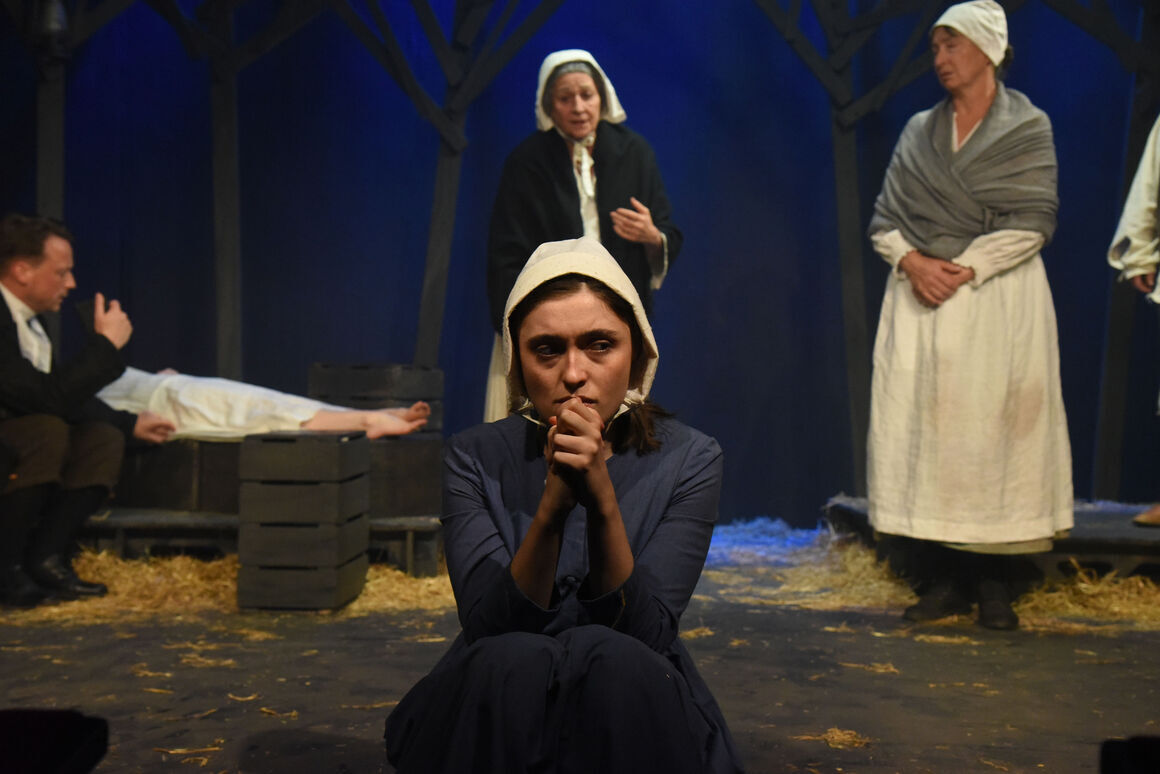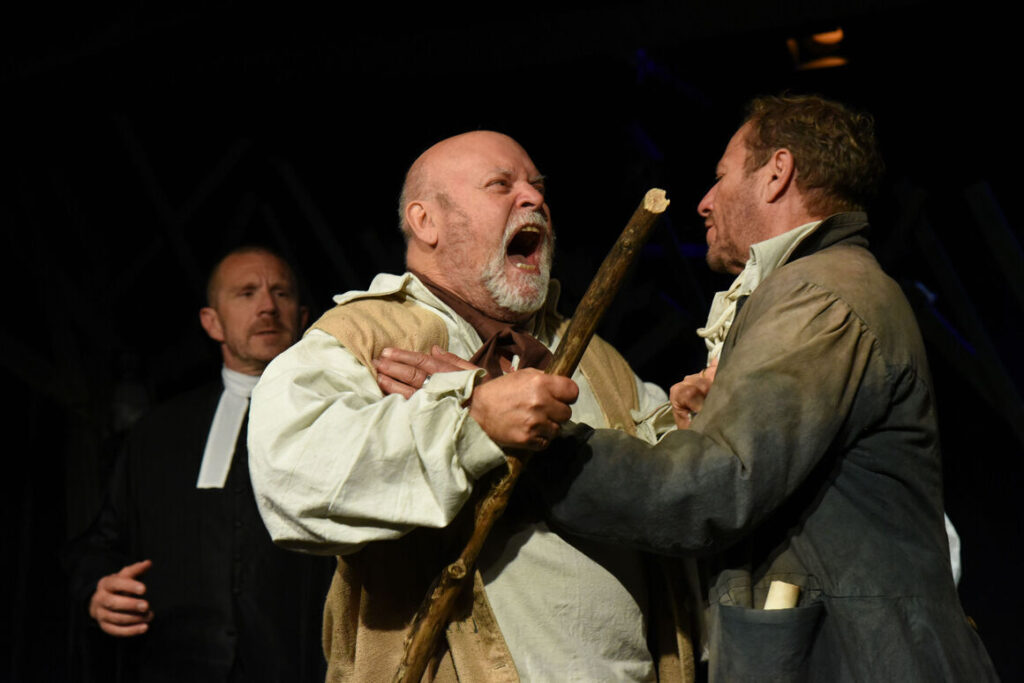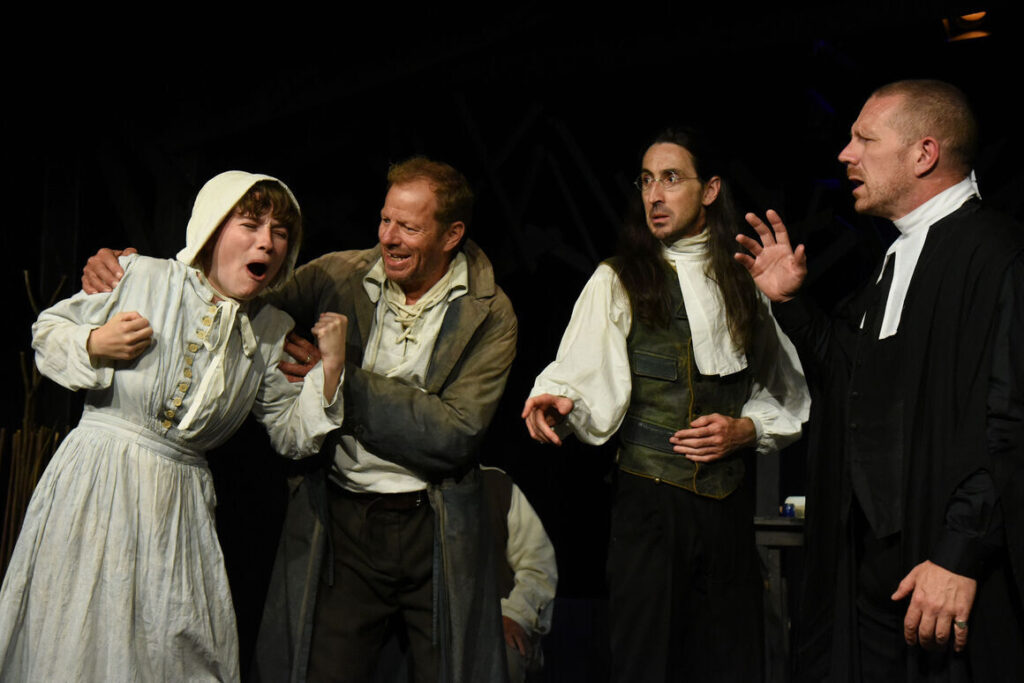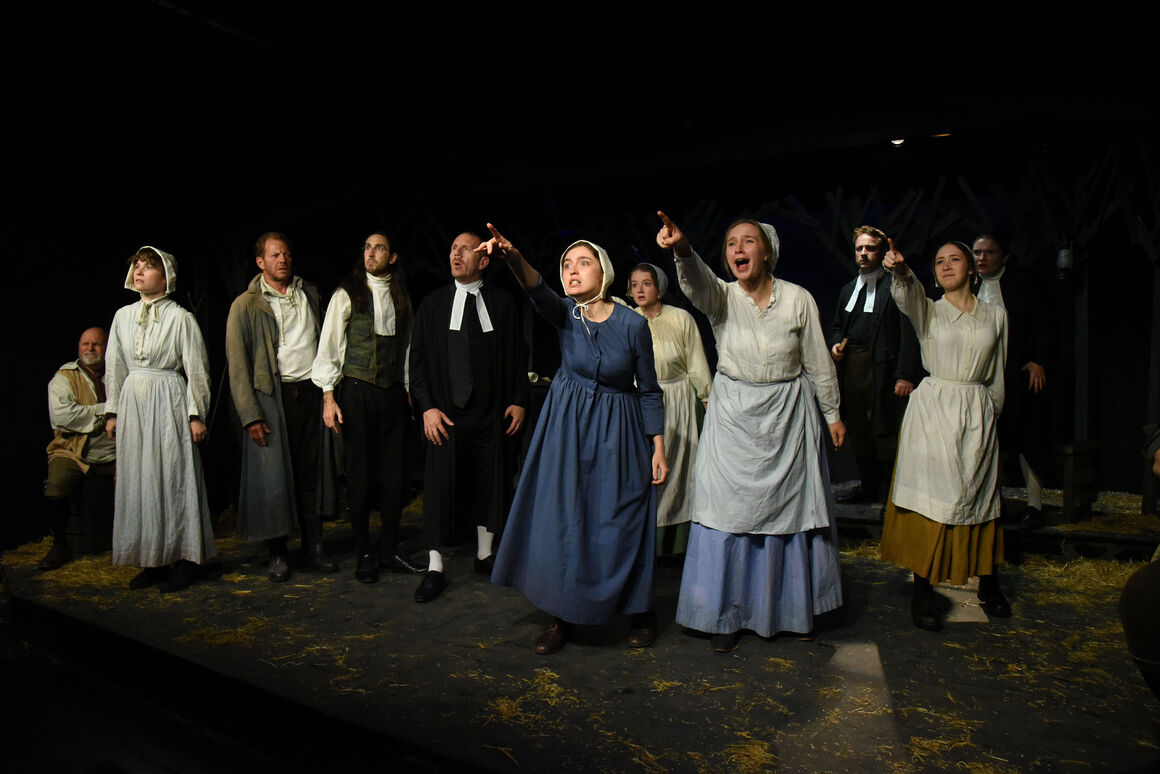Review by Simon Jenner, September 13 2025
★★★★(★)
“We live in a sharp time, a precise time” pronounces Deputy Governor Danforth. When Nettie Sheridan brought her Identity Theatre production of Arthur Miller’s 1953 The Crucible to BOAT’s open-air theatre in August 2018, who would have thought the Globe would also mount its own open-air production this year? And as Sheridan returns to a full-text version with Brighton Little Theatre till September 20, it’s sobering to reflect that five of six productions I’ve seen date from 2017 onwards. Sharp times.
One of the great things about this production is indeed how the cast brings out Miller’s language; repurposing adjectives and nouns into verbs. Partly using courthouse speech, both modernising and concrete metaphors, it repays relishing. We open though unusually with a short prologue about Salem’s witchcraft trials of 1692: sprung as we discover through the action of one girl both to protect herself and (in Miller’s version) pursue a man with catastrophic consequences. It’s a brief paraphrase of Miller’s introduction, worth returning to shortly.

Polly Jones (foreground) and ensemble. Photo Credit: Miles Davies
We’re transported to girls dancing in a wood, with some added incantations, then to the Reverend Parris of Act One. Steven Adams’ metallic trees resemble pewter-green gibbets: half-haunting, half-mechanical instruments of torture. It’s helped as the stage atmosphere is swung through Beverley Grover’s lighting to give it body along with props. And where Gary Cook’s sound discreetly points up the tension over two hours fifty. This is also a fleet-footed production: no longeurs. Everything goes at pace with aching pauses.
Andy Bell again leads as John Proctor, and you immediately see why he pinned back ears at BOAT, a tricky venue acoustically: the 2018 cast triumphed. At BLT, though projection is initially too much in this bijou space, Bell for instance knows how to modulate. It needs to be said at once that he’s on balance the finest Proctor I’ve seen. He bestrides the play morally and emotionally. He can smooth his guttural rage to swoop down on diminuendos, and rasp despair. The only point missed in this production (as in several, but here through spatial consideration) is how Proctor seasons the strew himself behind his wife Elizabeth’s back: symbolising the lack of it in their life.
From the start there’s division and havering in Thomas Dee’s fine Irish-inflected Reverend Paris, initially super-rational, then flipping to preserve his job, willing to side with unreason (Miller has hm proclaim his Harvard credentials; score-settling perhaps). Lily Wilks takes his comatose then hysterical daughter Betty with aplomb, attended by Tituba: exuberantly, seethingly taken by Zarrina Danaeva (a “clarion-voiced Dodger” I said of her in Sheridan’s Oliver Twist at BOAT last year, and Monday in The Man Who was Thursday). It should be said, knowing the character is Caribbean, that when checking the historical account, I found the original Tituba was Native American; and subsequently that Sheridan knows this too. They’re joined by Izzy Boreham’s anxious Mercy Lewis. Recalling her superb Amy in Bobby and Amy at BLT earlier this year, it’s no surprise Boreham details Mercy’s mix of fright and complicity.
It’s here that Polly Jones as Abigail Williams is introduced. Instigator of the witch scare, largely forced into it but amplifying accusations, Jones, known for her BLT roles as Emily in Bronte and Jo March in Little Women, is chillingly authentic with her violence more reined in than one or two with more stage-floor scope. Everything in Jones gears to control as she stares out the other girls. Against Bell Jones is half-wile, genuinely half-amorous, with a shudder from Bell. Faith McNeill’s Mary Warren, soft-voiced then bullied into speaking out is a role you have to ratchet from contained, even smug to terror-struck. McNeill sashays throughout, swayed this and that by Proctor and Abigail, more clearly than I’ve seen before.
Elizabeth Proctor (Joanna Ackroyd, who also arranges the Lullaby) is more assertive than some Elizabeths and the more welcome for it. There’s a shivering moment when the couple finally come together, almost overwhelming. Sheridan has blocked their encounters well, particularly in the climactic trial test, when Elizabeth is brought in to testify, unaware of what’s passed. Ackroyd manages a tremulous stand-offishness before then, provoking Bell’s “Elizabeth, your justice would freeze beer.” Her final reunion with Bell is achingly drawn as Elizabeth repeatedly tries not to judge by saying she doesn’t, but can’t help herself. Ackroyd gleams truth.
By contrast, there’s an explosive, disputatious thoroughly believable Giles Corey (Colin Rogers-Marsh, also on costumes). There’s great chemistry between him and Bell, who’s always trying to moderate Corey’s litigious lusts (even once on Proctor, who cheerfully forgave him). With a sturdy Marshall (Steven Adams, as ever designing everything) we see on a more mundane level a turncoat role like Parris but with more excuse: sometimes tripping up Proctor to his enemies, latterly pleading for him. Adams insinuates a doggedly blank literal-minded official.

Colin Rogers-Marsh and Andy Bell. Photo Credit: Miles Davies
Dug Godfrey makes a rugged, truculent accuser as Thomas Putnam, to complement Rogers-Marsh. He looms and booms avarice too, making a substantial impression. Libby Danahar multi-roles as Ann Putnam, Martha Corey and filthy prattling drunk Sarah Good, as working with props. Susanna Walcott (Olivia Jeffrey, with ID on Oh What a Lovely War and BT’s The Box of Delights, also stage-managing) is here even more nervous than usual, prone to terror.
It’s a while since we’ve enjoyed Joseph Bentley’s performances (recently at ID, often at BLT) but he’s sovereign as the conflicted, intelligent, ultimately truth-telling Reverend Hale. He brings to Hale a sympathy and early on an inner doubt you see disregarded by the burl and stride of more dominating characters. The way Bentley ratchets up his truth is exhilarating, sporting one of the most gorgeous then ragged set of costumes.
Leigh Ward as Danforth is as clear, strident, bullish and bullying as his roles have ever demanded. He adds here a hauteur and disdain. Few can catch Danforth’s chilling quiet that can contrast to spine-tingling effect. Ward though suggests a welcome, and believable physical menace. Beside him, Tacye Turner’s Judge Hathorne seems brushed aside by Danforth, but vocally centres the role, grasping Hathorne’s tithe of mischief.
With Danforth, Miller’s registering how new science with its measuring is encroaching on how religion and Danforth’s superstition operate: with no lassitude either way. But he’s also registering the fragility both of the colonial settlement and its temporary usurpation of powers from the English after the 1688 ‘Glorious‘ Revolution. Which as Miller points out, allows local mutations of justice and the catastrophe of Salem.
Liz Gibson though illumines the final scenes as Rebeca Nurse, movingly shadowing Bell’s visible struggle as Proctor’s conscience flounders. Neither judging harshly nor letting go, Gibson make you believe Hale’s praise of her, and when she staggers with her final line “I have had no breakfast this morning” it comes out as piteous and right.
The last scene though is Bells’ and Ackroyd’s. This is as explosive and yet passionate a I’ve ever seen. You wonder if they’ll embrace. The release here is palpable, and when Bentley a h/ale returns to remonstrate with Ackroyds Elizabeth her final line rings out. There’s a tiny postlude, and I’ve seen similar attempts before. I prefer Elizabeth’s last words, but it does produce the imagery we know is coming, and which (whether Elizabeth’s words are the last or not) are studded on some great productions.
It’s almost sold out. If there’s a cancellation on any night, you must see this.
Production Assistant/ Stage Manager Olivia Jeffrey
Set Design, Construction and Painting, Steven Adams, Painting Tom Williams,
Lighting Design, Beverley Grover,
Sound Design Gary Cook
Lighting and Sound Operation Tina Sitko
Projections Mimi Goddard
Properties Claire Prater, Libby Danahar
Costumes Myles Locke, Christine Fox, Colin Rogers-Marsh
Wigs/Make-up Design Patti Griffiths,
Lullaby Arrangement Joanna Ackroyd
Original Poste Design Jessica Streeter
Rehearsal Prompts Dawn Draper, Philip Bremner
Photography Miles Davies
Special Thanks to Paul Sheridan, Tess Gill, Charlotte Atkinson
Faith McNeill, Andy Bell, Joseph Bentley and Leigh Ward. Photo Credit: Miles Davies



